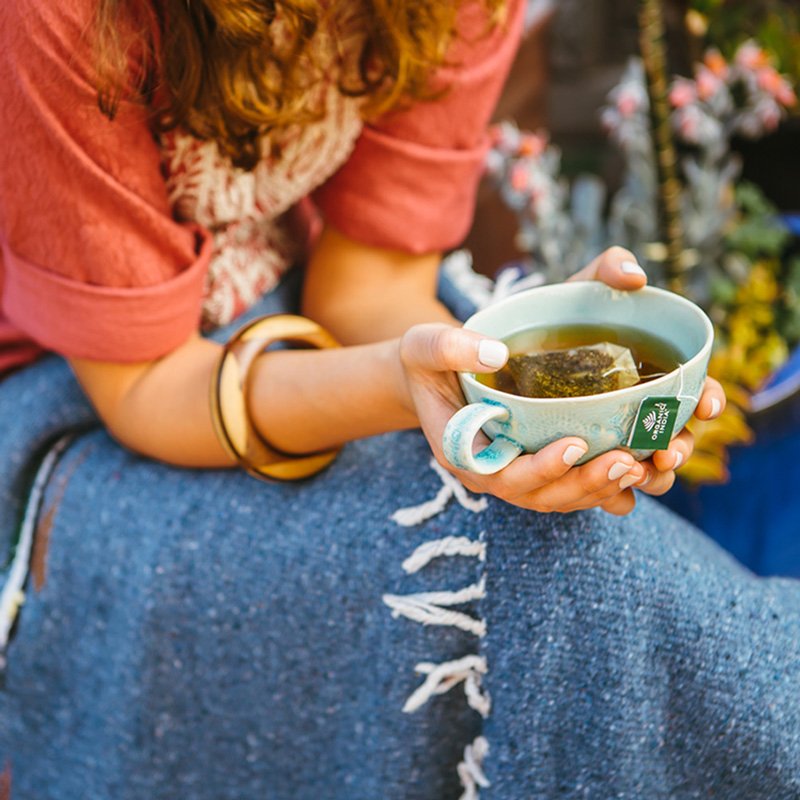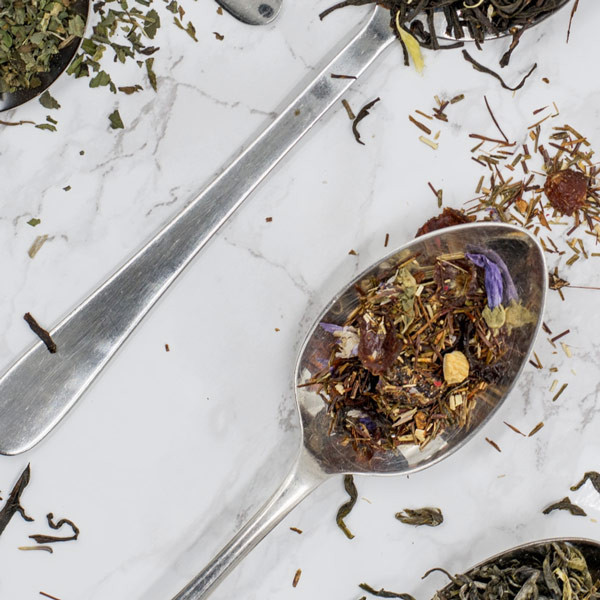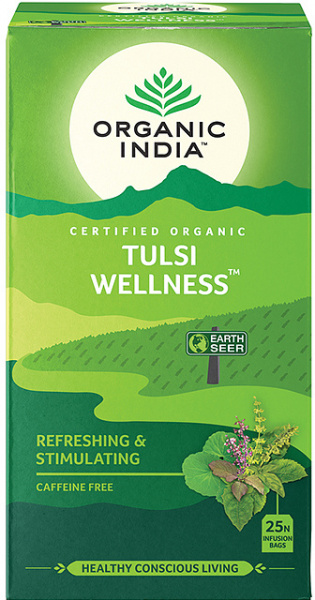Tulsi tea, made from the revered Ocimum Tenuiflorum plant, also known as “Holy Basil” and the “Queen of Herbs”, is considered the most sacred herb of India. Worshipped by Hindus for its spiritual powers as much as its restorative benefits, the tea has also been found to be incredibly nutritious, giving it a growing popularity in the West.

While from the same family as the much-loved basil (Ocimum Basillicum), the two are quite different plants. The familiar sweet taste and the incomparable aroma of common basil aren’t present in Tulsi, in which the leaves are usually dried and made into a regenerative and restorative tea. There are two main forms of Tulsi tea, one with reddish leaves, from the plant known as Krishna or Shyama tulsi, the other with green leaves which goes under the name of Rama Tulsi.
It is this method of introducing Tulsi to your lifestyle — with its incredible associated benefits — that we will focus on in this article.

The Sanskrit name for Holy Basil, Tulsi has been used heavily in Ayurvedic medicine for thousands of years and has a long history as a healing plant, with the leaves used chiefly as a medicinal tea. Ayurveda's holistic approach to healing means Tulsi is recognised as one of the pre-eminent plants used in various medicines for a range of ailments.
While the plant has a long history in Indian medicine and folk remedies it was also recognised as a holy plant by early Christian countries. Tulsi’s amazing restorative properties became apparent as the herb reached them from Asia on the early trade routes. This level of veneration in the Christian countries is reflected in the Latin botanical name of the herb, O. Sanctum, which is often used as a secondary name.
5 Reasons to start drinking Tulsi tea
Are you one of the many people turning to natural remedies to alleviate health problems? If so, you may wish to consider the merits of Tulsi tea. With antioxidant, anti-inflammatory, digestive and stress-relieving properties, it’s clear the tea may help in alleviating many conditions that are now prevalent in our own fast-paced society. Many conditions indeed that are considered now to be major health problems in our population are blamed on inflammatory conditions which give rise to conditions such as diabetes, Alzheimers and heart disease. While science is still unsure of the exact link, extensive research points to a link between inflammation and the chronic diseases mentioned above.
However, the anti-inflammatory properties of Tulsi are just one of its many health benefits. Here are just some reasons why you should consider drinking Tulsi tea:
Blood sugar control
Studies now confirm ancient claims made in Ayurvedic medicine that Tulsi is an excellent way of reversing diabetes and reversing blood glucose levels. Diabetes 2 occurs when the body is no longer able to break down glucose in the blood efficiently, a condition which can lead to high blood sugar levels and associated health conditions if left untreated. Tulsi helps to moderate these high levels, bringing the sufferer some control over the condition. Further reading on the research can be found here.

Relieves stress
Tulsi is one of the herbs that is recognised as an adaptogen; that is, it helps the body adapt to various stresses. We have evolved with this “fight or flight” response to external threats as an essential way to survive. However, the overreaction of our body to everyday stresses is causing major related diseases. In reducing the body’s stress response, the adaptogen helps reduce the chances of contracting these stress-related diseases. A meta study of 24 research findings found “The reviewed studies reinforce traditional uses and suggest Tulsi is an effective treatment for lifestyle-related chronic diseases including diabetes, metabolic syndrome, and psychological stress.” You may be interested in: Passionflower Tea.
Improves digestion
Tulsi tea has been shown to reduce stomach acid and boost protective secretions, which can relieve digestive complaints. Using the Tulsi leaves as a tea, or in an appetiser dish, can help promote effective digestion by encouraging digestive enzymes.
Helps treat respiratory ailments
Tulsi tea can help in a wide range of respiratory ailments from asthma, to simple coughs and colds. The herb has properties that can help suppress coughs, expel phlegm, and boost the immune system. The tea has a number of essential oils and anti-bacterial, anti-fungal, and anti-inflammatory properties that can help fight respiratory infections.

Helps prevent cardiovascular disease
Scientific research has now backed ancient Ayurvedic claims that Tulsi may also help in the battle against heart disease. Tulsi’s many properties include a reported ability to protect the heart. The holy basil contains vitamin C and other antioxidants such as eugenol, which combine to help protect the heart against damage caused by free radicals.
The health benefits of Tulsi tea are well and truly established as modern science catches up with thousands of years of use in Ayurvedic medicine.
My own experiments have found that a quiet cup of Tulsi tea, before bedtime or a meditation session, can help the mind to relax and unwind after a busy day. The pungent but pleasant taste and aroma are unique and it seems to work best (for me) as the type of tea that is sipped slowly, over a period of time.
Try it yourself, connect with centuries of Indian healing tradition and let us know your own experience with the “Queen of Herbs”.
As always we recommend you contact your health professional before drinking Tulsi tea. As a mild anticoagulant, it may not be suitable for people on blood-thinning medication.
You may also like: 5 Varieties of Tea you have got to try.

Love Health?
From recipes, trends and discounts, expect great things via email this month.
More Great Reads!

Behind The Brand: Antipodes
Recipes We Love!

Clever Cookies















